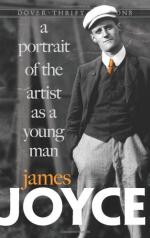—She too wants me to catch hold of her, he thought. That’s why she came with me to the tram. I could easily catch hold of her when she comes up to my step: nobody is looking. I could hold her and kiss her.
But he did neither: and, when he was sitting alone in the deserted tram, he tore his ticket into shreds and stared gloomily at the corrugated footboard.
* * * * *
The next day he sat at his table in the bare upper room for many hours. Before him lay a new pen, a new bottle of ink and a new emerald exercise. From force of habit he had written at the top of the first page the initial letters of the jesuit motto: A.M.D.G. On the first line of the page appeared the title of the verses he was trying to write: To E— C—. He knew it was right to begin so for he had seen similar titles in the collected poems of Lord Byron. When he had written this title and drawn an ornamental line underneath he fell into a daydream and began to draw diagrams on the cover of the book. He saw himself sitting at his table in Bray the morning after the discussion at the Christmas dinner table, trying to write a poem about Parnell on the back of one of his father’s second moiety notices. But his brain had then refused to grapple with the theme and, desisting, he had covered the page with the names and addresses of certain of his classmates:
Roderick Kickham
John Lawton
Anthony MacSwiney
Simon Moonan
Now it seemed as if he would fail again but, by dint of brooding on the incident, he thought himself into confidence. During this process all those elements which he deemed common and insignificant fell out of the scene. There remained no trace of the tram itself nor of the tram-men nor of the horses: nor did he and she appear vividly. The verses told only of the night and the balmy breeze and the maiden lustre of the moon. Some undefined sorrow was hidden in the hearts of the protagonists as they stood in silence beneath the leafless trees and when the moment of farewell had come the kiss, which had been withheld by one, was given by both. After this the letters L. D. S. were written at the foot of the page, and, having hidden the book, he went into his mother’s bedroom and gazed at his face for a long time in the mirror of her dressing-table.
But his long spell of leisure and liberty was drawing to its end. One evening his father came home full of news which kept his tongue busy all through dinner. Stephen had been awaiting his father’s return for there had been mutton hash that day and he knew that his father would make him dip his bread in the gravy. But he did not relish the hash for the mention of Clongowes had coated his palate with a scum of disgust.
—I walked bang into him, said Mr Dedalus for the fourth time, just at the corner of the square.
—Then I suppose, said Mrs Dedalus, he will be able to arrange it. I mean about Belvedere.




